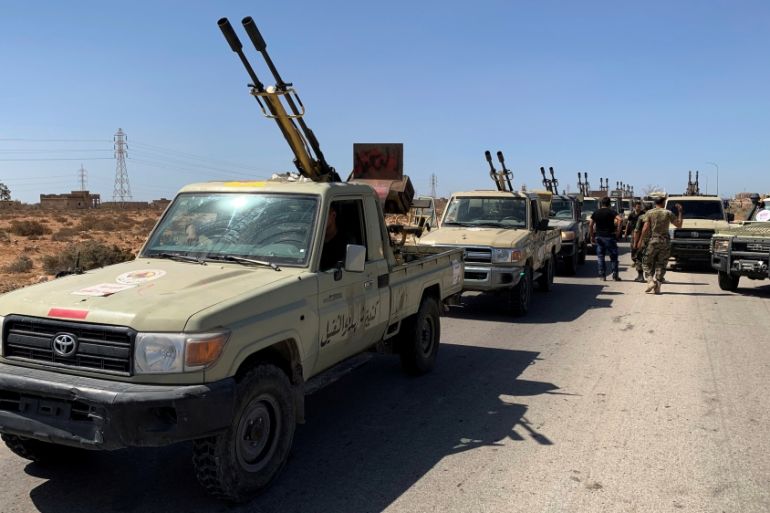UN says Libya sides reach ‘permanent ceasefire’ deal
Libya’s warring sides sign agreement for ‘a permanent ceasefire in all areas’ in what the UN calls a ‘historic achievement’.

Libya’s warring sides signed an agreement for “a permanent ceasefire in all areas of Libya”, the UN Libya mission said on Friday, raising hopes the long-running conflict may finally reach a lasting peace.
Scepticism in some quarters was raised, however, as previous truce deals over the years have failed to end the fighting.
Keep reading
list of 4 itemsLibya rivals sign ‘permanent ceasefire’ deal: Live news
Libya: Military leaders resume UN-sponsored talks
UN’s Libya envoy ‘quite optimistic’ on ceasefire talks
The United Nations said the two sides reached the “historic achievement” with an immediate permanent ceasefire deal across the oil-rich North African country.
After mediation led by UN envoy Stephanie Williams this week, the 5+5 Joint Military Commission reached what the UN called an “important turning point towards peace and stability in Libya”.
The accord – concluded in Geneva after talks between military representatives of the internationally recognised Government of National Accord (GNA) and renegade commander Khalifa Haftar’s eastern-based Libyan National Army (LNA) – will be followed up with political discussions in Tunisia next month.
According to the deal, all mercenaries and foreign fighters will leave Libya within three months.
‘Enough bloodshed’
Ali Abushahma, a field commander for the GNA administration in Tripoli and the head of its delegation, said: “We have had enough suffering, enough bloodshed. I appeal to all Libya: Be one hand,” he said, warning of polarisation by factions.
Amraja Alamami, head of Haftar’s delegation, pledged in a short speech to “implement what had been agreed upon in Geneva”.
Following Libya’s descent into chaos after a NATO-backed uprising in 2011, a UN-recognised government holds sway in the capital, Tripoli, in western Libya, while Haftar’s forces run most of the east and south.
Turkey is the main patron of the Tripoli government, while the United Arab Emirates, Russia and Egypt back Haftar.
Both sides are also supported by an array of fractious militias, though the administrations often struggle to control them. In much of the country, heavily armed militias hold sway and have repeatedly undermined ceasefire attempts.
International pressure has been building on the parties to avert a battle over the strategic city of Sirte, the gateway to Libya’s major oil export terminals.
Jason Pack from the The Middle East Institute noted some factions have used previous ceasefires to import weapons to gain the advantage over those who abided by the halt in fighting.
“I don’t want to poo poo these efforts – Stephanie Williams has done a great job – but what she’s really achieved is seizing the optics for the UN, and that’s great because it puts the primacy of the UN track over Russian and Turkish tracks. So good on her,” he told Al Jazeera.

Flight from Tripoli to Benghazi
Meanwhile, first commercial passenger flight in more than a year from Tripoli landed in the eastern city of Benghazi on Friday as an apparent part of the deal.
In another sign of progress, the key oil ports of Ras Lanuf and al-Sidr would soon resume production. Libya’s prized light crude has long been a key factor in the country’s civil war, with rival militias and foreign powers jostling for control of Africa’s largest oil reserves.
In Geneva, the UN’s Williams hailed the agreement in a live broadcast after the signing.
“I am honoured to be among you today to witness a moment that will go down in history. The road was long and difficult at times. Your patriotism was your way forward and you were able to reach a ceasefire agreement,” she said following the ceremony.
“Today is a good day for the Libyan people,” she said, adding she hoped the deal would allow displaced people and refugees to return to their homes.
Williams did, however, express some caution noting a “long and difficult” road remains ahead.
It is not clear how the ceasefire will be enforced – given the patchwork of militias in Libya – but Williams said armed groups and military units agreed to return “to their camps” and the deal would take effect immediately.
Foreign mercenaries will depart “from all Libyan territories land, air and sea” within three months, she added, referring to the thousands of Syrian fighters deployed by Turkey and Russia on opposite sides of the war. The agreement also involved the formation of a joint military force and a mechanism to monitor violations, Williams said, and will be sent to the UN Security Council.
‘Multi-dimensional chess game’
But shortly after the announcement of the deal, Turkish President Recep Tayyip Erdogan said it “does not appear to be achievable” – even as he expressed hope all parties would stick to it.
Speaking after Friday prayers in Istanbul, Erdogan said the ceasefire decision did not come from top officials but from lower-level ones. “Time will show how long it will last,” he added.
Pack from the Middle East Institute also expressed scepticism saying Erdogan “is a smart man”.
“He understands Libya is a multi-dimensional chess game. They haven’t dealt with the underlying issues,” Pack said, noting issues such as who controls government ministries and oil revenues has yet to be agreed on.
The Geneva-based talks come ahead of a political forum in Tunisia in November. That forum aims to “generate consensus on a unified governance framework and arrangements that will lead to the holding of national elections,” the UN mission said.